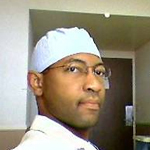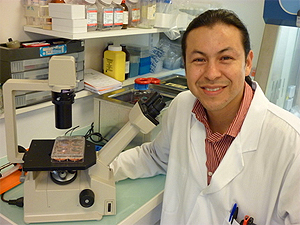Alums Dubbed Emerging Scholars
Two graduates of SDSUs Minority Access to Research Careers program are recognized for their academic research by Diverse magazine.

San Diego State alumni Kristian Brown and Geanncarlo Lugo-Villarino were recognized as two of the nation’s top 12 emerging scholars by Diverse: Issues in Higher Education magazine.
The magazine, a national higher education trade publication, recently released its annual list of emerging scholars —a select group of minority academics recognized for their innovative work in the field of science.
Brown and Lugo-Villarino’s outstanding academic achievements, combined with their resilience in the face of personal challenges, distinguish them from other scholars throughout the nation.
At 19, Brown, who earned his bachelor’s degree in chemistry and molecular biology at SDSU, survived a rare neurological disease that completely paralyzed him for nine months. After bouncing back, he now dedicates his work to giving people a second chance at life.
Since receiving his Ph.D. in engineering at Wayne State University, he has earned numerous awards and is the author of 11 publications. Currently, Brown is a transplant surgeon at Wayne State University, and assistant adjunct professor of biomedical engineering.

Geanncarlo Lugo-Villarino was once told he'd never amount to anything; now, he works in biomedical research.
Lugo-Villarino was often told he was never going to amount to anything. He said people looked down on him and his 2.8 high school GPA, but with help and encouragement from diversity program mentors, he made an amazing transformational journey.
Starting at Southwestern College, he went on to earn his bachelor’s degree in cellular and molecular biology at SDSU. He eventually received his Ph.D. in immunology from Harvard University. Lugo-Villarino is currently doing postdoctoral studies at the Centre National de la Recherche Scientifique in Toulouse, France.
MARC scholars
Growing up in challenging neighborhoods with very little peer support, both Brown and Lugo-Villarino agree on the impact academic programs and mentors had on their individual careers.
At a time in Brown’s life when not many people believed in him and he was hearing a lot more “nos” than “yeses” he credits the mentoring he received from SDSU’s Minority Access to Research and Careers program for encouraging him to continue.
“Few were willing to take a chance on me and even fewer believed that I could actually become a viable, impactful scientist,” Brown said. “The program gave me the one 'yes' that I needed. I have never looked back.”
The SDSU program identifies high-achieving underrepresented minority scholars in the area of biomedical science. Through the program, each student is given monetary support, and is paired up with a professor-mentor to conduct research in a lab.
Lugo-Villarino agrees, “The mentoring and program's family environment made all the difference for me to believe in myself and be convinced that I could go all the way in higher education.”
Maureen Gibbins, a mentor to both scholars and coordinator for the Bridges to Baccalaureate program, said watching their journey through SDSU’s diversity programs was inspiring.
“SDSU’s MARC program has become a transformative gateway for minority scholars, expanding their horizons to reach that house upon the hill that they once never thought to be achievable,” Gibbins said.
Paying it forward
Seeking ways to express their gratitude to all the people who have helped them get to where they are today, both Brown and Lugo-Villarino find satisfaction in mentoring future scientists from minority backgrounds.
Lugo-Villarano said the best way to honor his mentors is to do for a new generation of students what they did for him.
“I discovered that mentoring students empowers you with a sense of indescribable fulfillment that no money or prize could provide for.”
Brown agrees with the importance of paying it forward.
“I mentor because I was mentored," Brown said. "I was taught that mentorship was not an act but a way of thinking. Mentorship is inextricable with what I do.”
Emerging scholar
When asked about how it feels to be recognized as an emerging scholar, Brown focused on his future.
“It is a great honor and is indeed humbling,” Brown said. “But I have so many goals to achieve so the operative word in this recognition is ‘emerging;’ I am indeed a work in progress.”



